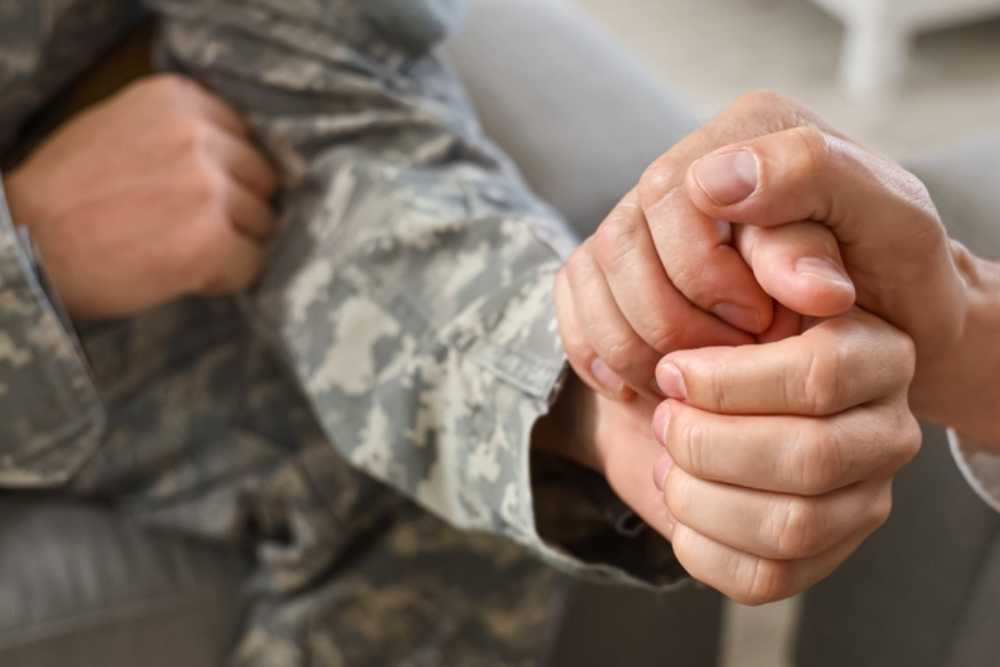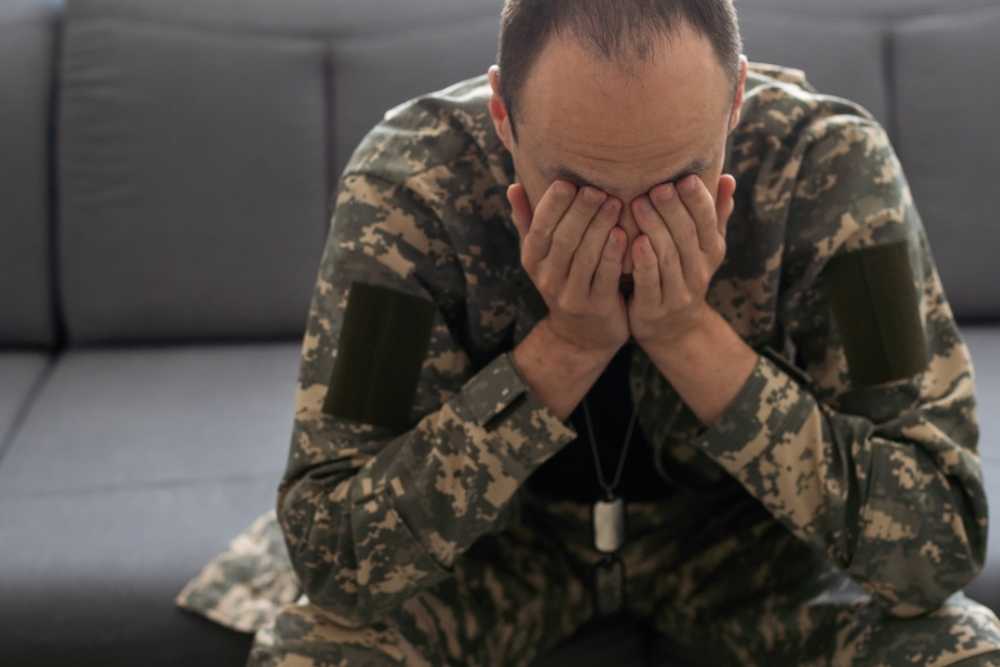Military trauma can create profound and lasting psychological wounds that affect every aspect of a veteran’s life. Military trauma counseling becomes crucial because these experiences often involve exposure to life-threatening situations, moral injury, loss of comrades, and the challenge of transitioning from a highly structured military environment back to civilian life. Combat trauma frequently leads to PTSD, depression, anxiety, and substance abuse issues. These conditions don’t simply resolve on their own with time.
Without professional intervention from a veterans mental health program, symptoms often worsen and can lead to relationship problems, employment difficulties, social isolation, and in severe cases, suicidal thoughts or behaviors. Attending mental health counseling often pays dividends in improved relationships, better job performance, reduced medical costs, and, most importantly, a better quality of life for veterans and their families.

How Does Combat or Service-Related Trauma Impact Mental Health?
Combat and service-related trauma can fundamentally alter brain function and mental health in ways that extend far beyond what most people experience in civilian life. The intensity and nature of military trauma create unique psychological challenges that can persist long after service ends.
- Neurological Impact: Exposure to combat situations triggers the brain’s survival mechanisms, flooding the system with stress hormones like cortisol and adrenaline.
- PTSD: PTSD is perhaps the most recognized consequence. Symptoms needing PTSD treatment include intrusive memories, nightmares, hypervigilance, emotional numbing, and avoidance of trauma reminders.
- Depression and Anxiety Disorders: The transition from the structured, mission-focused military environment to civilian life often triggers depression.
- Substance Abuse: Many veterans turn to alcohol or drugs to self-medicate trauma symptoms. The numbing effects of substances can temporarily relieve nightmares, anxiety, or emotional pain, but ultimately worsen mental health and create additional problems with relationships, employment, and physical health.
- Sleep Disorders and Physical Health: Trauma often disrupts sleep patterns, leading to insomnia, night terrors, or sleep apnea. Poor sleep exacerbates all other mental health symptoms and can create a cycle where trauma symptoms prevent restful sleep, which then makes coping with trauma more difficult.
- Relationship and Social Challenges: Veterans may struggle with intimacy, trust, and communication in relationships. The hypervigilance and emotional numbing that helped them survive in combat can make it challenging to connect with family and friends.
The severity and combination of these impacts vary significantly among individuals, depending on factors like the nature and duration of trauma exposure, personal resilience, social support, and whether they receive appropriate treatment.
What Makes Trauma-Informed Counseling Different from Standard Talk Therapy?
Trauma-informed counseling represents a fundamental shift in therapeutic approach, moving from asking “What’s wrong with you?” to “What happened to you?” This distinction creates an entirely different foundation for healing that recognizes trauma’s profound impact on the brain, body, and behavior.
Standard talk therapy often assumes that people can simply discuss their problems rationally and develop insights that lead to change. Trauma-informed counseling recognizes that trauma literally changes brain structure and function. The therapist understands that trauma survivors may have difficulty accessing rational thought when triggered, and that traditional “just talk it through” approaches can sometimes retraumatize patients by pushing them to discuss details before they’re ready.
While regular therapy focuses on building rapport, trauma-informed therapy makes safety the absolute priority. This includes physical safety in the therapeutic environment, emotional safety through predictable boundaries and procedures, and psychological safety by ensuring the client maintains control over the pace and content of sessions. The therapist actively works to avoid retraumatization and helps clients recognize their internal safety signals.
Traditional talk therapy primarily engages the thinking mind, but trauma gets stored in the body and nervous system. Trauma-informed counselors pay attention to physical responses, breathing patterns, body language, and nervous system activation. They may incorporate techniques that help clients reconnect with their bodies in safe ways, understanding that healing trauma requires addressing both mind and body.
Mental Health Treatment That Works
Call 949-625-0564What our customers are saying
Can Counseling Improve Relationships for Veterans Coping With Trauma?
Counseling can dramatically improve relationships for veterans coping with trauma, often serving as a bridge back to meaningful connections with partners, children, family members, and friends. Trauma’s impact on relationships is profound, but with proper therapeutic support, veterans can rebuild and even strengthen their bonds with others.
- How Trauma Damages Relationships: Military trauma often creates barriers to intimacy that weren’t there before service. Veterans may experience emotional numbing, which can make it difficult for them to express love or affection.
- Individual Therapy as a Foundation for Relationships: Often, relationship improvement begins with individual trauma therapy. As veterans learn to manage PTSD symptoms, regulate their emotions, and process traumatic experiences, they naturally become more emotionally available to their loved ones.
- Couples and Family Therapy: Specialized couples therapy for trauma survivors addresses the unique challenges military families face. Partners learn about trauma responses and how to support their veteran without enabling avoidance behaviors.
- Communication Skills Development: Trauma often damages communication patterns. Veterans may become withdrawn and uncommunicative, or alternatively, may react with anger when they feel misunderstood.
What Are the Best Evidence-Based Therapies for Military PTSD?
Several highly effective, evidence-based therapies have been specifically validated for treating military PTSD. The most recent evidence is compelling that these trauma-focused therapies are the standard for treating military depression and PTSD.
- Cognitive Processing Therapy (CPT): CPT is one of the most widely used treatments for military PTSD. This therapy focuses on helping veterans examine and challenge the unhelpful thoughts and beliefs that developed following their traumatic experiences.
- Eye Movement Desensitization and Reprocessing (EMDR): EMDR involves recalling traumatic memories while engaging in bilateral stimulation (typically eye movements). This process appears to help the brain reprocess traumatic memories, making them less emotionally charged and more manageable.
- Cognitive Behavioral Therapy (CBT): CBT is considered to have the most substantial evidence for reducing the symptoms of PTSD in veterans and serves as the foundation for many trauma-focused treatments.
Treatment matching is becoming increasingly important. Some veterans respond better to exposure-based treatments, while others do better with cognitive approaches. Factors like military branch, type of trauma, personality characteristics, and personal preferences all influence which treatment works best.

Key Takeaways on Military Trauma Counseling
- Combat and service-related trauma fundamentally alter brain function in ways that extend far beyond typical civilian experiences.
- Standard talk therapy often falls short for trauma survivors because it doesn’t account for how trauma changes the brain and nervous system.
- While military trauma often damages relationships through emotional numbing, hypervigilance, and communication barriers, counseling can rebuild and even strengthen these connections.
- Multiple highly effective, research-proven therapies exist specifically for military PTSD.
- Early intervention through trauma-informed therapy can prevent more severe mental health crises, reduce the risk of substance abuse, and suicide.
Military trauma counseling offers specialized mental health support tailored specifically for veterans and active-duty service members who have experienced the unique challenges of military life. These counseling services aim to address issues such as PTSD, anxiety, and depression, fostering a pathway to healing through a compassionate and understanding approach. If you or someone you know needs support at outpatient mental health centers in Southern California, please reach out to Moment of Clarity at 949-625-0564 today.
Resources
- U.S. Department of Veterans Affairs –Overview of VA research on Posttraumatic Stress Disorder (PTSD)
- National Library of Medicine –PTSD Treatment for Veterans: What’s Working, What’s New, and What’s Next
- National Library of Medicine –A Review of PTSD and Current Treatment Strategies




